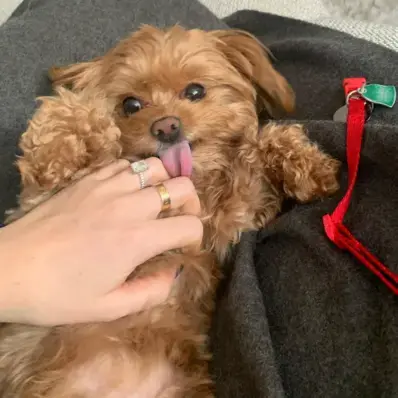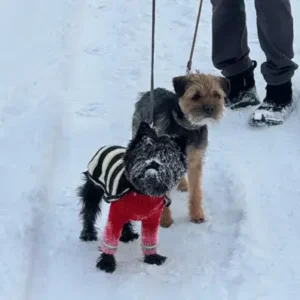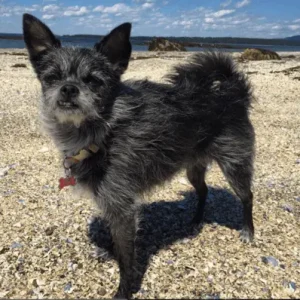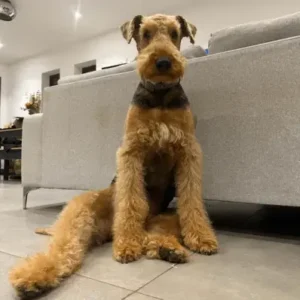Yorkipoo History/Origin
The Yorkipoo is a delightful hybrid dog breed created by intentionally crossing the Yorkshire Terrier and a Toy or Miniature Poodle. Although it might appear to be a recent innovation, the Yorkipoo has only been around for a few decades.
Its rise can be linked to the growing popularity of designer dog breeds that combine desirable traits from both parent purebreds.The goal was to produce a small dog with a hypoallergenic coat. This was done to cater to allergy sufferers.
The intention was also to reduce genetic health issues associated with poor breeding in Yorkshire Terriers and Poodles.
While the Yorkipoo gained significant popularity in recent years, it truly began to receive attention in the early 2000s. Initially, most Yorkipoo litters were the result of first–generation breeding, designed to highlight the strengths of both breeds.
However, as interest in the breed grew, some breeders shifted their focus to multigenerational breeding to establish more consistent traits and characteristics.
Yorkipoo Personality
The Yorkipoo is an active, affectionate, and playful dog breed that thrives on human companionship. This loyal companion eagerly participates in family activities, showcasing confidence inherited from its terrier background while remaining easygoing and low-maintenance.
Its intelligence enables it to become an excellent pet with consistent, positive training, allowing it to adapt well to different situations. Although dog the Yorkipoo enjoys observing the world from its owner’s lap, it also loves exploring independently. A well-adjusted Yorkie poo puppy will typically exhibit curiosity and playfulness, engaging willingly with people.
- Potential Challenges
While Yorkipoos are generally affectionate and adaptable, they can face several potential challenges. Their intelligence means they require consistent training and mental stimulation to prevent boredom, which can lead to undesirable behaviors like excessive barking or chewing.
Additionally, their small size may make them prone to anxiety if not properly socialized from an early age, potentially leading to timidness or over-attachment to their owners. Because of their terrier heritage, some Yorkipoos may exhibit stubbornness, requiring patience and positive reinforcement during training.
Yorkipoo Physical Appearance
The Yorkipoo is a compact and charming breed, blending traits from the Yorkshire Terrier and the Poodle. With a rounded head, expressive dark eyes, and either floppy or semi-erect ears, they exude cuteness. Their well-proportioned body features a slightly longer torso and sturdy legs, with tails held high, reflecting their lively personality.
- Size
The Yorkipoo, with its adorable and compact frame, is a small breed that truly embodies the essence of a lap dog. These charming dogs usually stand about 7 to 10 inches tall at the shoulder, making them excellent small companion dogs for a variety of living spaces, including apartments and smaller homes. Their lightweight structure further enhances their appeal, with adult Yorkipoos generally weighing between 4 to 15 pounds.
- Coat color
The Yorkipoo’s coat features a delightful variety that ranges from straight to curly, providing a soft and silky texture that feels luxurious to the touch. Each Yorkipoo’s coat can vary, especially those from multigenerational breeding. Their coat can vary, resembling either the Poodle’s hypoallergenic coat or the Yorkshire Terrier’s fur. While the idea of a completely non-shedding dog is somewhat of a myth—Often classified as low-shedding, they can be a suitable option as hypoallergenic dogs, making them beneficial for individuals with allergies.
This breed comes in a versatile array of colors, including cream, black, white, red, sable, apricot, tan, chocolate, gray, and silver, often featuring various markings, such as black with tan accents.
Sable Yorkipoo- Source: luluyorkipoo
Apricot Yorkipoo- Source: myla.the.yorkipoo
Cream Yorkipoo- Source: myla.the.yorkipoo
Yorkipoo Gender Differences
When it comes to Yorkipoos, size isn’t a reliable way to tell males from females, as their size can vary based on which parent they resemble more. While some say females are easier to train and males are more affectionate, a dog’s true personality depends more on its socialization and treatment throughout life.
Yorkipoo Feed/Nutrition
Feed your Yorkipoo between 1/4 to 1 cup of high-quality dry food each day, divided into two meals. The exact amount your adult dog needs will vary based on factors like size, age, metabolism, and activity level.
Just like people, dogs are unique, and their dietary needs differ. An active dog will require more food than a less active one. Additionally, the quality of the dog food matters; higher-quality food is more nutritious, allowing for smaller portions.
To keep your Yorkipoo healthy, measure out meals and feed him twice a day instead of leaving food out all the time. Bananas can be a great, healthy treat for your dog in moderation.
Yorkipoo Health Problems
Yorkipoos, like all breeds, may face certain health conditions. While not every individual will be affected, it’s essential to be aware of these potential issues when considering this breed. When acquiring a puppy, it’s advisable to choose a reputable breeder who can provide health clearances for both parents.
- Epilepsy: This neurological disorder can cause seizures that range from mild to severe, characterized by unusual behavior, staggering, or even collapsing. While witnessing seizures can be distressing, dogs with idiopathic epilepsy often have a positive long-term outlook with appropriate diagnosis and treatment.
- Patellar Luxation: Common in small breeds, this condition involves the dislocation of the kneecap, leading to discomfort and mobility issues. While it can be debilitating, many dogs live normal lives with this condition.
- Legg-Calve-Perthes Disease: This hip joint disorder results from decreased blood supply to the femur’s head, leading to its disintegration. Surgery can provide pain relief and improve mobility. Keeping your Yorkipoo at a healthy weight and ensuring they get regular exercise can help maintain joint health and prevent complications.
- Hypothyroidism: This thyroid gland disorder may manifest as symptoms like epilepsy, hair loss, obesity, and skin issues. Treatment typically involves medication and dietary adjustments.
- Addison’s Disease: This serious condition stems from insufficient production of adrenal hormones, resulting in symptoms such as vomiting, poor appetite, and lethargy. Timely diagnosis through veterinary tests is essential for effective treatment.
- Atopic Dermatitis: This inherited skin condition causes allergic reactions to common substances, leading to symptoms like itching, redness, and hair loss. Treatment options include avoiding allergens, using antihistamines, and applying hypoallergenic shampoos.
- Portosystemic Shunt: This condition involves abnormal blood flow between the liver and the body, impairing the liver’s ability to detoxify and metabolize nutrients. Symptoms can include neurobehavioral issues, lack of appetite, hypoglycemia, gastrointestinal problems, urinary tract issues, and stunted growth, typically appearing before two years of age.
Regular veterinary check-ups are essential for the early detection and prevention of health issues in Yorkipoos. These visits enable veterinarians to monitor your dog’s health, identify potential concerns, and implement preventive measures. Consistent health assessments enhance your Yorkipoo’s quality of life and contribute to a longer, healthier lifespan.
Yorkipoo Care and Grooming
The Yorkipoo mixed breed is a versatile companion that thrives in both houses and apartments, with indoor living essential for its well-being. Daily exercise is crucial, as this small breed has surprising energy levels; a stroll or playtime in the yard, along with activities like hallway fetch, keeps them happy.
Crate training is beneficial, providing a safe space to prevent accidents and offering a cozy retreat. However, avoid keeping your Yorkipoo crated for long periods—ideally no more than a few hours at a time, except for overnight sleep.
Although Yorkipoos are considered non- to low-shedding, their fine coat requires regular care. Daily brushing prevents tangles, and occasional trimming around the eyes helps prevent irritation. Bathing should occur as needed rather than on a fixed schedule.
Dental care is vital; brush their teeth two to three times a week to prevent tartar buildup. Nail trimming should happen monthly, and seek professional help if needed. Regular ear checks for redness or unusual odors are also important.
Introducing grooming routines early helps your Yorkipoo get used to brushing, paw handling, and mouth inspections. It’s essential to provide your dog with fresh water daily to keep them properly hydrated and healthy.
Positive grooming experiences set the stage for easier veterinary visits. Regular grooming allows for early detection of any health issues. This ensures your Yorkipoo’s overall well-being. House training your dog early on is also important for establishing a routine and avoiding accidents indoors.
Yorkipoo Rescue Groups
If you’re looking to adopt, many rescue groups specialize in Yorkipoos and other designer breeds. These organizations can help you find a good match for your family, offering dogs in need of loving homes. Adopting from a rescue is a great way to give a second chance to a dog in need while supporting responsible pet ownership.
How Much Does Yorkipoo Cost?
The price of a Yorkipoo typically ranges from $900 to $3,000, depending on factors such as breeder reputation, pedigree, and location.
When looking for Yorkipoos for sale, it’s crucial to seek out breeders who follow ethical breeding practices. These breeders prioritize the health and well-being of their dogs, ensuring proper care and genetic screening. By supporting responsible breeders, you can help promote healthy, happy dogs while avoiding the risks associated with puppy mills.
Interesting Facts
- Depending on their genetic makeup, Yorkipoos can have a coat that ranges from wavy to curly, with varying degrees of softness, which can change as they mature.
- While Yorkipoos are not known for excessive barking, they may bark to alert their owners to new sounds or visitors. This behavior showcases their natural watchdog instincts, which they inherit from the Yorkshire Terrier.
Best For
The Yorkipoo is best suited for individuals or families looking for a small, affectionate, and low-maintenance companion. Their playful and adaptable nature makes them ideal for apartment dwellers or those with limited space. Additionally, their low-shedding coat can be a great option for people with mild allergies.
Top Names
| Male Yorkipoo Names | Female Yorkipoo Names |
| Max | Bella |
| Charlie | Daisy |
| Oliver | Lucy |
| Milo | Zoe |
| Finn | Lola |









 Yorkshire Terrier – Source:
Yorkshire Terrier – Source:  Poodle – Source:
Poodle – Source: 

 Sable Yorkipoo- Source:
Sable Yorkipoo- Source:  Apricot Yorkipoo- Source:
Apricot Yorkipoo- Source:  Cream Yorkipoo- Source:
Cream Yorkipoo- Source: 







